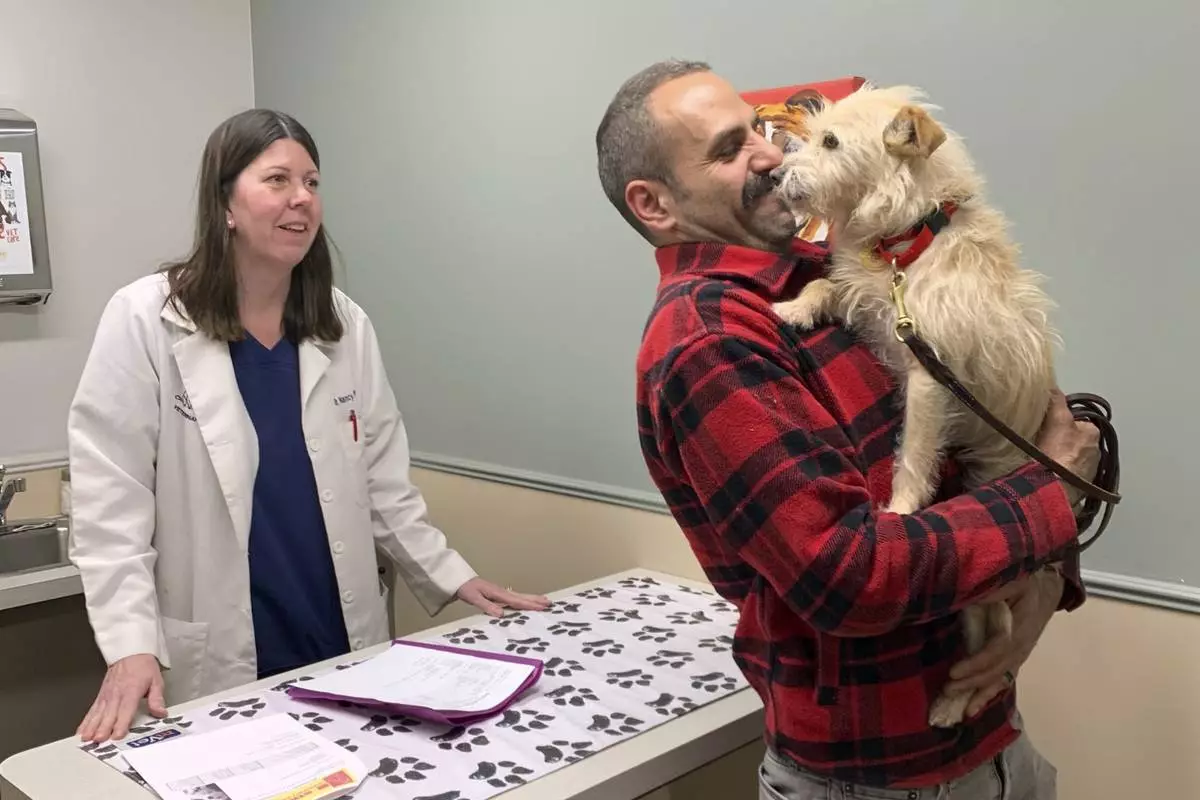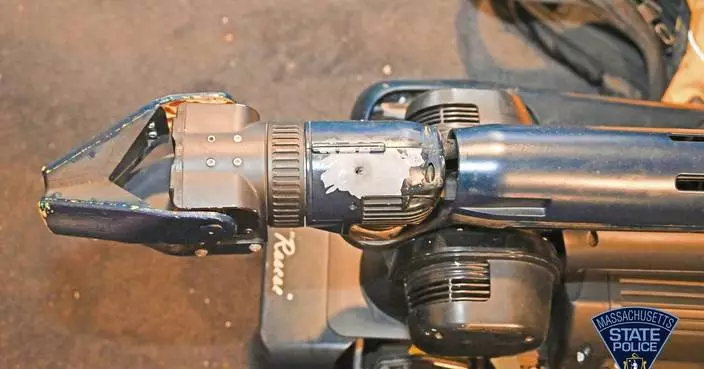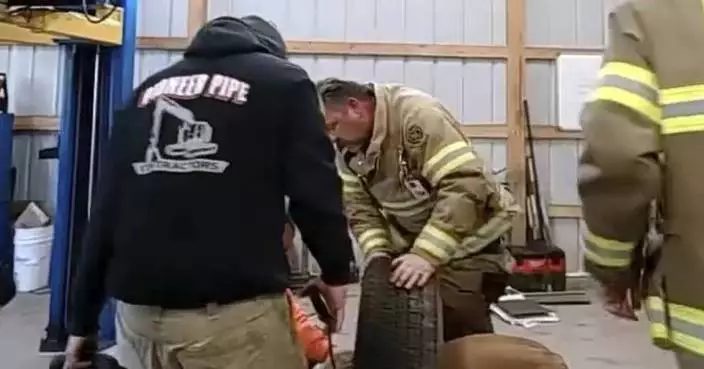Leaping from the van, South Sudan's only two patrol dogs raced toward passengers disembarking a plane in the capital, Juba. After frantically sniffing their luggage, one dog abruptly sat in front of a wary young man and stared at his bag. Removing a piece of ivory from a side pouch, the man breathed a sigh.
It was just a drill, though the dogs hardly need practice runs to sharpen their skills. Ivory and illegal animals regularly flow through this civil war-torn nation that advocacy groups say has become a critical hub for traffickers.
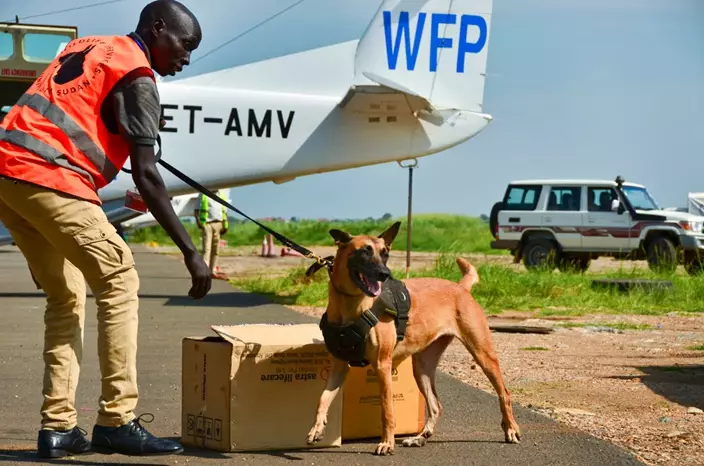
In this photo taken Thursday, July 27, 2017, an anti-trafficking "sniffer" dog inspects passengers' luggage for contraband on the tarmac of the airport in Juba, South Sudan. A two-dog team has been tasked with protecting the entirety of war-torn South Sudan from a flow of ivory and illegal animals, as advocacy groups say the country has become a critical African hub for traffickers. (AP Photo/Mariah Quesada)
"The breakdown of the rule of law and order and the lack of political will to combat the illicit trafficking of wildlife means that South Sudan won't be able to stem the currently out-of-control slaughter and exploitation," said Brian Adeba, associate director of policy at the Enough Project, a Washington-based advocacy group.
A report by the group in July found that South Sudan's conflict has made the East African nation a major way point for ivory and wildlife smuggling.
The consequences of South Sudan's nearly five-year-old civil war have been far-reaching. As the country grapples with starvation, mass displacement and allegations of war crimes, the increased insecurity has led to porous borders and impunity for trafficking crimes.
"People use South Sudan because they believe the laws are soft," said Khamis Adieng, director of external relations for the Ministry of Wildlife Conservation and Tourism.
Most illegal imports come from neighboring Sudan, Uganda and Congo, Adieng said. He attributed the free flow of goods to the lack of government capacity, severe insecurity and the country's vast landscape.
In an attempt to stem the flow, the wildlife ministry and the New York-based Wildlife Conservation Society launched South Sudan's first anti-trafficking canine unit in January 2016.
The two trained Malinois dogs have been tasked with combatting wildlife trafficking in the entire country. With their handlers they work six days a week, patrolling Juba's airport and checkpoints along the capital's roads.
Results are encouraging, the canine team said.
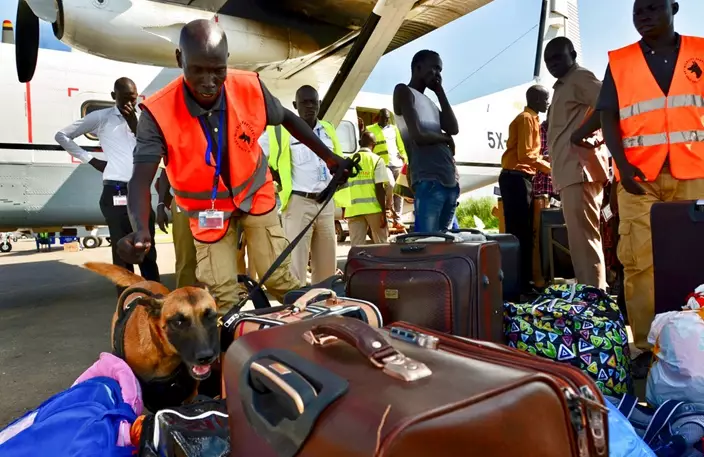
In this photo taken Thursday, July 27, 2017, an anti-trafficking "sniffer" dog inspects passengers' luggage for contraband on the tarmac of the airport in Juba, South Sudan. A two-dog team has been tasked with protecting the entirety of war-torn South Sudan from a flow of ivory and illegal animals, as advocacy groups say the country has become a critical African hub for traffickers. (AP Photo/Mariah Quesada)
"Last year I captured ivory every week and bush meat every day," said Moses, one of the dog handlers. Now it's roughly once and twice a month, respectively. It was not clear whether trafficking was down or people had found other routes. He gave only his first name because of concerns about possible retaliation.
At the airport in February, the dogs discovered 14 pieces of ivory stuffed into two jerry cans full of peanut butter. It was being smuggled by a South Sudanese woman on her way to Egypt, the patrol team said.
And in June, the canine unit confiscated 25 boxes of ivory bound for Malaysia. The ivory originally came from Burundi and passed through Rwanda and Uganda before reaching Juba, the unit said.
Despite the successes, wildlife experts said the problem remains widespread. People are desperate to make a living, said Michael Lopidia, the former deputy director for the Wildlife Conservation Society in South Sudan.
The deteriorating economy also puts wildlife in the country's six national parks at risk. From January to October, 13 elephants were killed, the wildlife ministry said.
Antelope is the animal most widely killed and sold on the local black market, said the canine team, while one of the most sought-after animals for international sale is the pangolin. Demand is high, particularly in China.
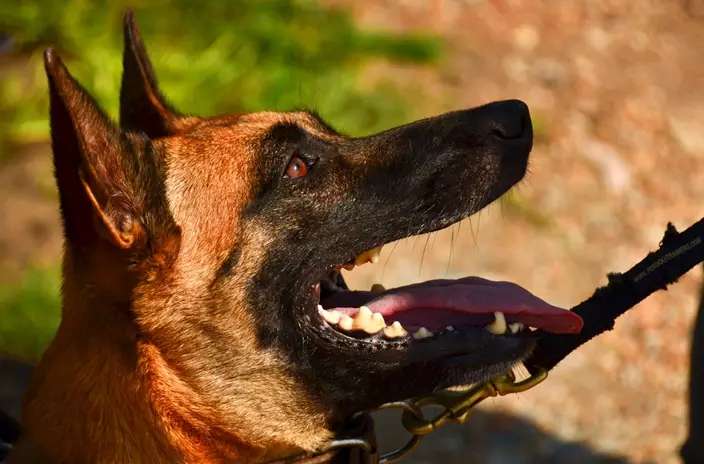
In this photo taken Thursday, July 27, 2017, an anti-trafficking "sniffer" dog that inspects passengers' luggage for contraband is seen on the tarmac of the airport in Juba, South Sudan. A two-dog team has been tasked with protecting the entirety of war-torn South Sudan from a flow of ivory and illegal animals, as advocacy groups say the country has become a critical African hub for traffickers. (AP Photo/Mariah Quesada)
Without South Sudan's "lucrative middle of the illegal wildlife trafficking chain," the wildlife would never reach East Asia, the Enough Project said. The group has asked the government to plug the "gaps that proliferate the illicit activity at entry and exit points across the country."
With two dogs for the entire nation, however, Adieng said the government can only do so much.
"We're struggling," he said. He hopes to bring in more dogs to patrol areas outside the capital, especially along the country's borders.
Ultimately, Adieng said, the canine team can't work properly until the war ends. "We're praying to God that peace will come."



